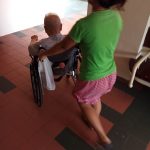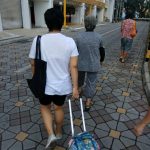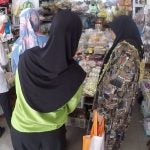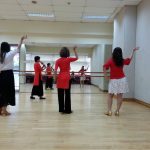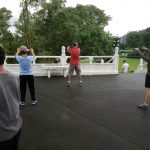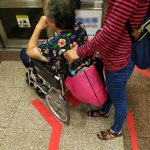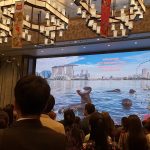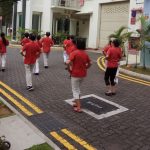Moved to care: Ageing, migration and care
Asia Trends 2020 webinar and panel discussion
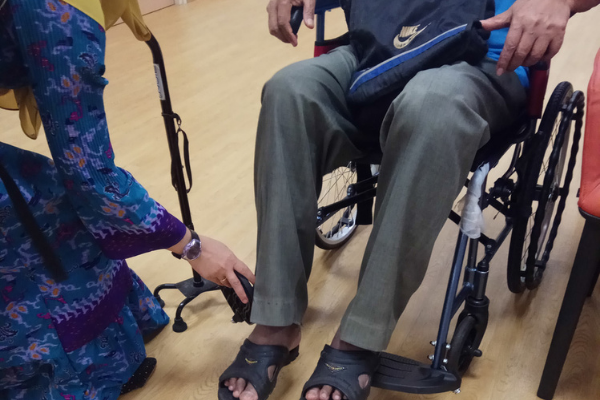
https://doi.org/10.25542/tg9s-zdxp
What is the nature of eldercare in rapidly ageing Singapore? How are we as a nation reliant on care migration and what are the challenges that follow? Members of the Transnational Relations, Ageing and Care Ethics (TRACE) research team joined a diverse panel of guests for ARI’s flagship public outreach event, Asia Trends 2020.
Moved to Care addressed the intersections of ageing, migration, and care. Moderated by TRACE Principal Investigator A/P Elaine Ho, the panel included Co-Principal Investigator A/P Thang Leng Leng, Ms Gillian Tee (CEO, Homage), Mr Wong Kai Wen (Senior Planner, Urban Redevelopment Authority), and Dr Wong Loong Mun (Principal Consultant, Agency for Integrated Care).

Photo essays from the TRACE research project
Panellists took turns responding to a photo essay featuring fieldwork conducted by the TRACE team. Accompanying the photos from fieldwork were selected sound bites from ethnographic interviews conducted with four different groups of respondents (see above).
Aside from highlighting key research themes of the TRACE project, the vignettes served as prompts for the panellists to share their expertise and insights from their respective fields.
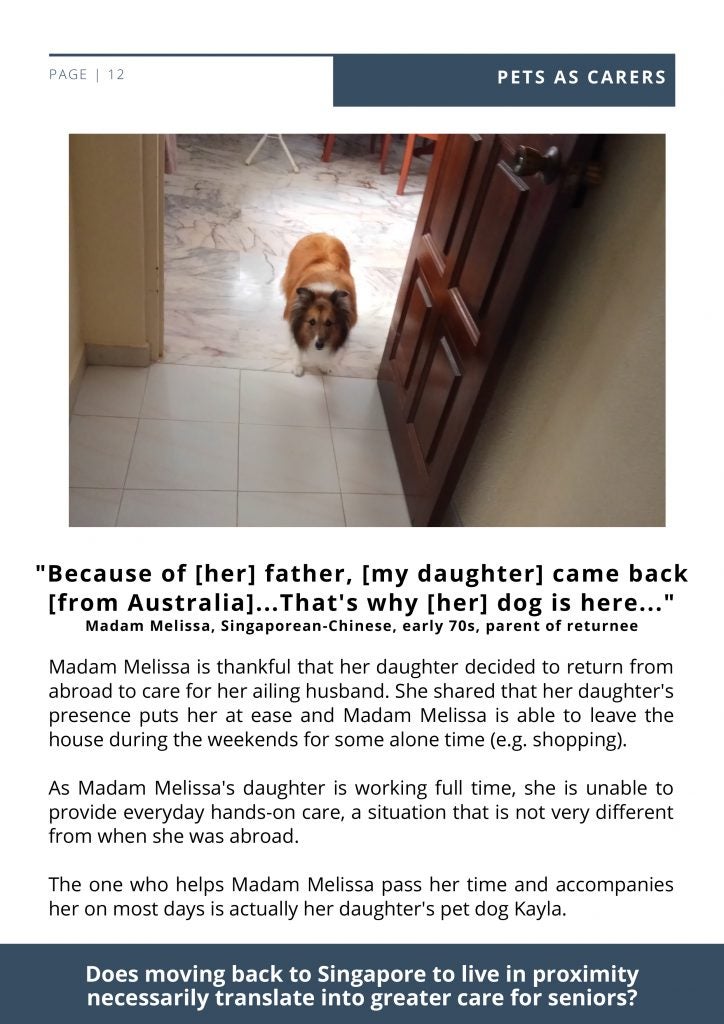
Return migration and caregiving
Ms Gillian Tee chose a photo, ‘Pets as Carers’, which depicted how, despite the return migration of the (human) caregiver, it was still a pet which provided companionship for the senior on most days. This raised important questions about the nature of companionship and social care. Ms Tee recounted her decision to return to Singapore as a young professional working overseas so that she could be closer to her family and be more present for her mother and wider family members. As the founder of Homage, a tech-based start-up that matches caregivers with families, Ms Tee further observed that primary caregivers often experience stress and guilt, especially those caring for seniors with complicated health and medical conditions.
Citing the need for more personalised and flexible care solutions, Ms Tee argued that there is no one-size-fits-all approach to what it takes to age well and that there should be less stigma associated with asking for greater support. There has, however, been a gradual but welcome shift as more caregivers take up respite care support services and adopt holistic forms of wellness proactively outside the home.
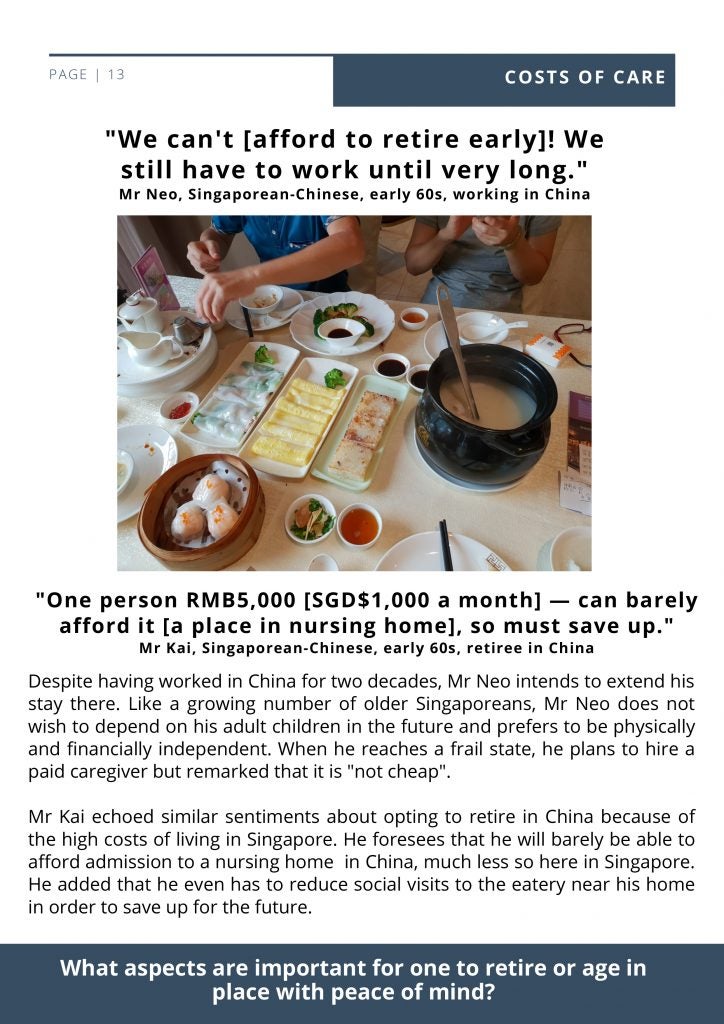
Securing peace of mind through overseas retirement
A/P Thang Leng Leng’s response to ‘Costs of Care’ put the spotlight on older Singaporeans ageing overseas rather than in Singapore (see image above).
A/P Thang’s involvement in TRACE fieldwork on older Singaporeans in China (with Dr Sylvia Ang) enabled her to carry out interviews with 34 Singaporeans above the age of 50 who had worked/lived in China for the long term.
These respondents were largely middle-class and financially stable, with some owning properties in Singapore and/or China. Still, A/P Thang noted that the cost of retirement and care remains a big concern even among those who seem relatively well-off.
For many of these respondents, financial security figured greatly in their decisions to live overseas. This finding reflects a wider trend in international retirement migration to Southeast Asian countries such as Malaysia and Thailand. A/P Thang highlighted that such empirical findings contradict dominant discourses within the ageing literature arguing that ageing-in-place and at home constitute ideal forms of later life living.
Such findings throw into sharp relief assumed conceptions of ageing and emphasise the relevance of migration and mobility surrounding contemporary ageing trends.
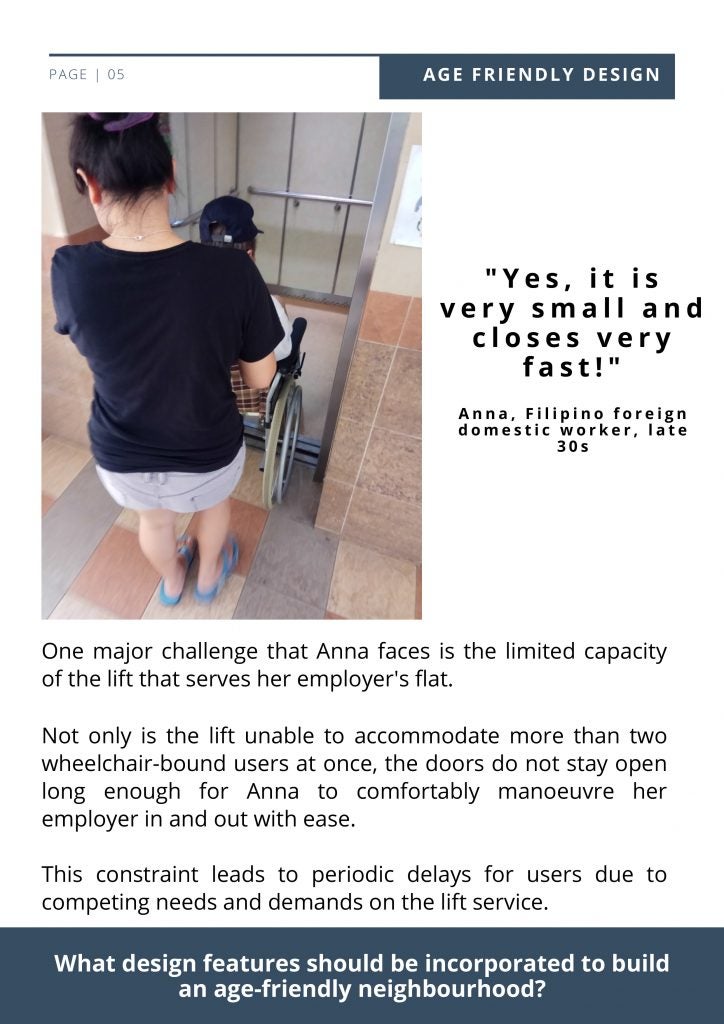
Fostering inclusion and building an age-friendly city
Mr Wong Kai Wen transitioned the discussion back to ageing within Singapore, providing a macro perspective on the topic of building an age-friendly city. Speaking in his capacity as a senior research planner, Mr Wong mentioned how land planning for an ageing population is a key research objective for the Urban Redevelopment Authority (URA) given that in just 10 years, Singapore can expect to see a projected population growth of 900,000 seniors over the age of 65.
Citing the agency’s ‘age-friendly neighbourhoods’ study, Mr Wong emphasised co-creating public infrastructure and communities with seniors to better serve their needs. Citing a second study undertaken by the URA, Mr Wong brought up the issue of ageism, such as the NIMBY (not-in-my-backyard) sentiments expressed by residents regarding the building of nursing homes in close proximity with residential spaces. The challenges posed to urban planners thus go beyond spatial considerations and include cultural ones as well.
Responding to ‘Age Friendly Design’, Mr Wong highlighted two words quoted in the photo essay: ‘small’ and ‘fast’. He observed that in a small city-state like Singapore, the expectation of some Singaporeans that their daily lives would operate at a fast speed is one that affects planning considerations too.
A perennial question guiding planning decisions is: who do we plan for and from whose perspective? Planning for an age-friendly city also needs to take into account the expectations of other Singaporeans whose lifestyle needs are different.
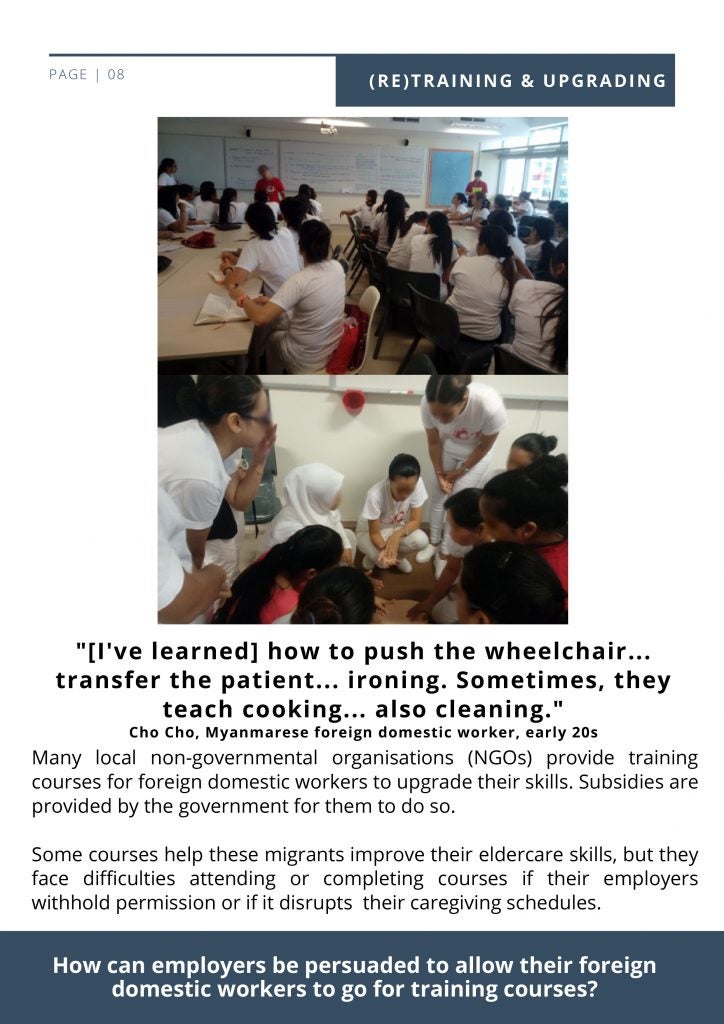
Overreliance on migrant care labour
In response to ‘(Re)Training & Upgrading’ depicting Foreign Domestic Workers (FDWs) at a caregiving training course on their day off, Dr Wong Loong Mun, said the image reflected the feminised nature of care work.
Dr Wong spoke of the assistance that the Agency for Integrated Care (AIC), where he is Principal Consultant, provides in managing the transition of elderly patients from the hospital to the home and other facilities such as rehabilitation centres. He emphasised the critical need for proper caregiver training, observing that families often expect hospitals to impart such training prior to the patient’s discharge even though a longer period of training would be ideal.
Dr Wong added that the government has long considered caregiving training to be crucial to eldercare, noting that state-subsidised caregiver training grants have been around for 15-20 years and is not limited to advanced caregiving duties such as support for seniors who are unable to perform Activities-for-Daily-Living (ADL). He wrapped up his segment by reflecting on the long-standing issue of how society undervalues the interdependent relationship between migrant care labour and those requiring care.
Question-and-answer segment
A recurring theme from the audience centred around the support landscape for caregivers, touching on aspects such as their mental health and areas for improvement.
Ms Tee emphasised that respite care goes a long way towards easing the physical and mental toll on caregivers, citing the example of days off for FDWs, day-care centres that provide respite options, and the services of supplementary providers like Homage.
On the topic of service providers, a question on the lack of community care services for private housing estates sparked a lengthy discussion on gaps within the current model of public provisions.
All panellists agreed that more could be done to meet the needs of private residential owners even as different recommendations were floated, including A/P Thang’s suggestion that condominium management committees could consider age-friendly initiatives, and Ms Tee’s proposal that preventative services such as health screenings could be collectively procured by condominium residents.
All the panellists agreed that technology can play a complementary role in supporting caregiving needs, but high-touch, personalised forms of psycho-social care required by seniors will remain important. Mr Wong also brought up potential problems that tech could bring, such as privacy and ethical concerns related to the use of surveillance tools.
Academics in the audience were particularly interested in questions specific to TRACE’s research findings, such as how decisions to receive care overseas are made, and how care is negotiated when families live apart. Referencing the project, A/P Ho and A/P Thang shared on the importance of the support provided by FDWs in enabling Singaporeans to provide care for their aged parents from a distance.
The webinar concluded with a question on volunteerism support in an ageing society. A/P Thang used the example of dedicated insurance schemes for volunteers in Japan, while Dr Wong praised the culture of volunteerism in Taiwan, where volunteer management is treated as an art. The panellists also acknowledged local grassroots efforts, such as churches and temples, which have contributed towards volunteerism in Singapore.
The Moved to Care panel discussion enhanced public knowledge on how ageing and care are experienced during migration and enabled through the support of migrant carers.
ARIscope is edited by Theodora Lam, Gerard McCarthy, Michelle Miller and Eve Warburton. The views expressed in this forum are those of the individual authors and do not represent the views of the Asia Research Institute, National University of Singapore, or the institutions to which the authors are attached.
Citing the need for more personalised and flexible care solutions, Ms Tee argued that there is no one-size-fits-all approach to what it takes to age well and that there should be less stigma associated with asking for greater support.






